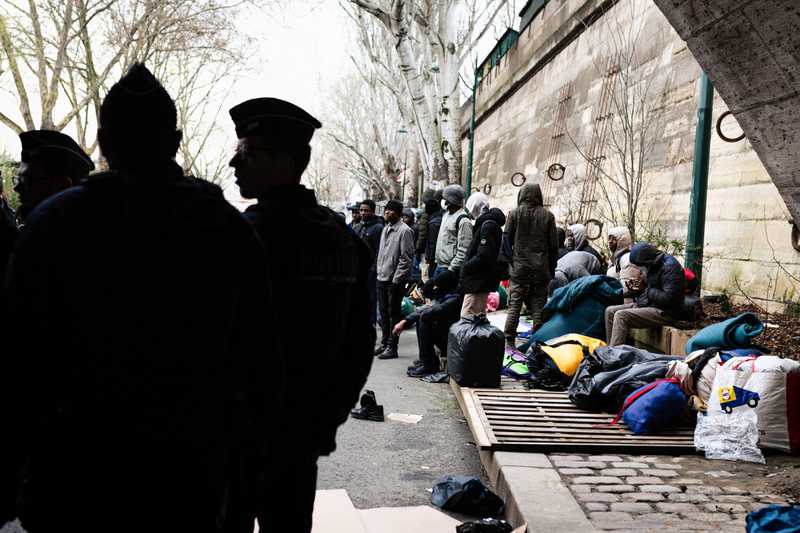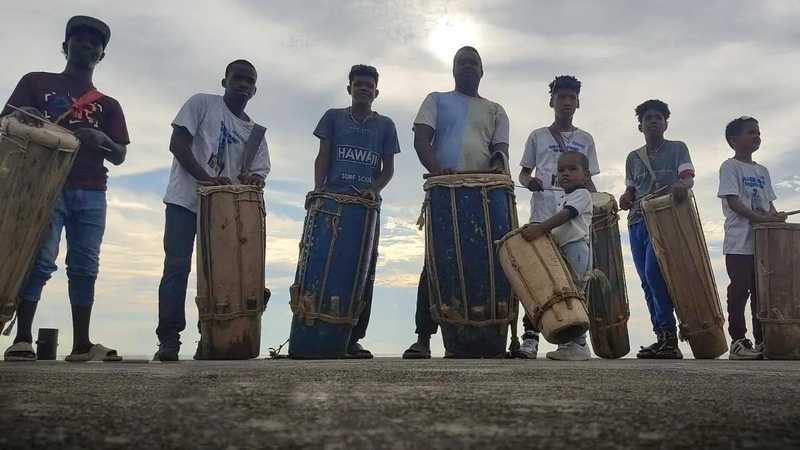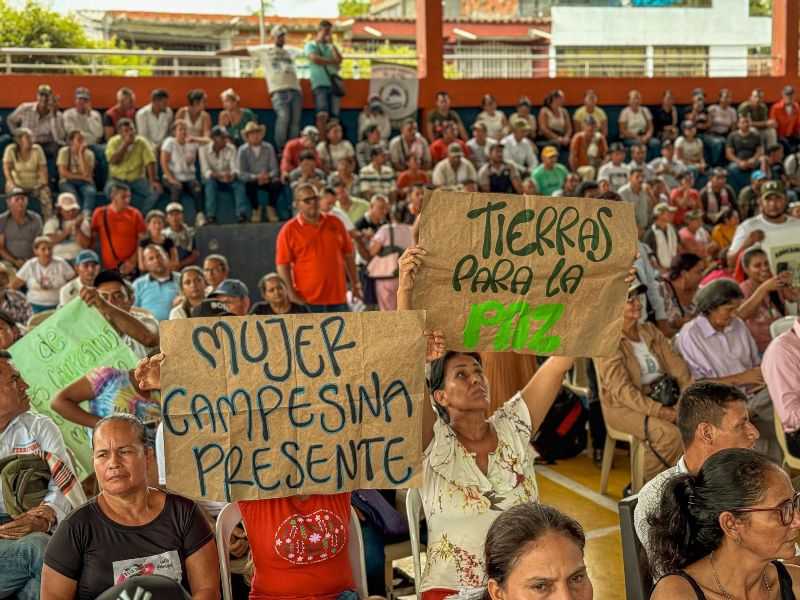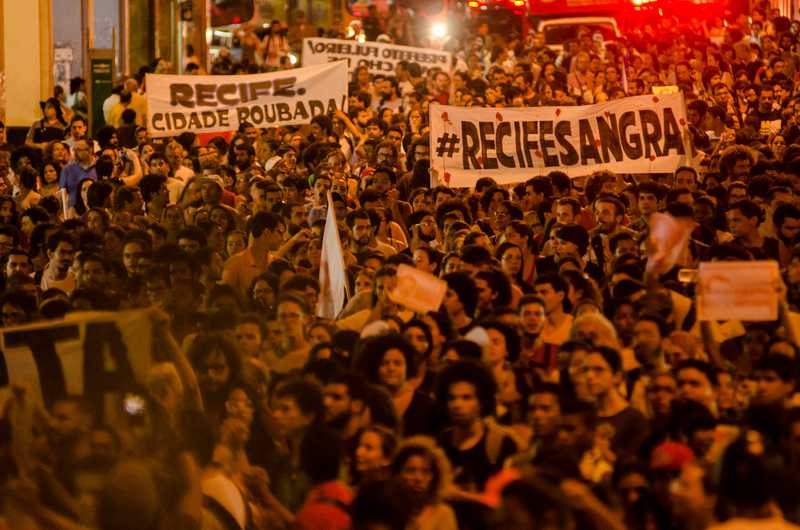
In the centre of Paris’s 11th arrondissement (district), a hip area known for its younger crowds and lively bars, stands the Maison des Metallos. A brass sculpture of a lyre sits atop the tall metal gates of the listed 19th-century factory, the House of Steelworkers is a performing arts centre owned by the city. Since April, its facade has been covered in banners and posters.
Amidst the shiny new infrastructure the city has built ahead of the Olympic Games, which start in July, the slogans on the House of Steelworkers have a distinctly May ‘68 feel – a sort of semi-permanent protest. “The situation is critical,” one banner reads. “No housing, no Olympic Games. We are staying in Paris.”
Once a factory for brass musical instruments and later the meeting point for France’s metalworkers’ union, the Maison des Metallos is a symbol of the city’s rapidly disappearing working class, as a former centre of manufacturing has industrialised, becoming arguably the world capital of luxury goods. Now in its seventh week of occupation, the Maison is currently home to the Collectif des Jeunes du Parc de Belleville, or the Belleville Park Youth Collective.
Lost boys.
The group was founded last summer by about 20 unaccompanied child migrants living in an encampment in Belleville Park to help support each other in the face of aggressive police action; it has since grown to over 170 children. With the public approval of employees of the centre (one of the reasons the collective headed to the building after being evicted was because they anticipated support there), the collective took over the Maison on 6 April after police evicted them from the encampment, as they have done repeatedly since October last year. All 170 children are now living in the building.
While the Maison has become a haven for these children, the occupation is not a glamorous affair. The occupiers have too few mattresses between them, and routinely put out requests for food and other supplies on their social media channels: their only kettle broke recently, so they asked if anyone in the neighbourhood had one to donate.
One occupier, who asked to remain anonymous, told Novara Media that the collective would have liked to accommodate the regular cultural programming the Maison usually puts on. He says the offer was refused by Alice Vivier, the centre’s director.
Until recently, the occupation has been begrudgingly tolerated by the city’s leadership. It has, however, been welcomed with open arms by locals, who have joined the group in regular protests against the Olympics and the mass evictions that have accompanied it both outside of the Maison and across the city. But the collective is not naive – it knows it is in a delicate position, and that given the police’s infamous treatment of migrants, confrontation is an ever-present possibility.
The group has called the encampment eviction part of a concerted effort by the Ile-de-France prefecture and the national government to remove all signs of homeless people before the Olympics – something that was happening long before the games came to the city, but which they have accelerated.
Condé, who asked that we only use his first name, came to France on his own from Guinea earlier this year. “I’ve been sleeping outside since March, and police [have] pushed me from one [encampment] to another,” he told Novara Media. “We know the preparations for the games will and are already affecting us. I am worried they will try to send us out of the city.” For Condé, the occupation is not just a political statement – it’s one of the only places he feels safe.
Olympics in, homeless out.
Under a new law approved by the French parliament in April last year, France has seen its unhoused people – almost 2,000 so far – from the capital to ten temporary accommodation centres around the country. Most of those banished have so far been drawn from Paris’s migrant population.
According to Georges Bos, director of the centre for migrants to the government delegation for housing, the law has nothing to do with the Olympics. Activist groups such as the Belleville Collective, as well as 60 national organisations, including Médecins du Monde and Emmaus France, disagree: they insist it is an attempt to clean up the city in time for the summer.
Condé and most of the young people who make up the collective find themselves in a strange legal vacuum. Upon arrival in France, most of them were not recognised as minors by regional legal authorities; Condé was told he could not have credibly made it all the way to France on his own if he were really 16. Being legally unclassified as minors within the asylum system means they cannot access housing or education.
“These tactics are part of the government’s wider stance on immigration, which is oppressive and racist,” said migrant organiser Kahina Guelamine-Richard and spokesperson for the Belleville Collective at a May protest in front of the Parisian board of education. “France has been on a mission to reduce overall access to resources for immigrants,” she said (in December, France passed an immigration bill described by French human rights groups as “the most regressive bill of the past 40 years for the rights and living conditions of foreigners”).
“On the eve of the Olympics,” Kahina continued, “the repressive arm of the state has never been so powerful, but the will to make these people disappear is not only because of the games […] they are simply a perfect excuse for the police to request more funding and to remove people very quickly.”
Although originally founded to support themselves against police oppression, the Belleville Collective has come to lead the charge against the Olympics. There are others, though – among them Saccage2024 (Destruction2024), a collective of residents and associations in Paris and Saint-Denis organising against what they term a lasting “destruction of the city”- the Belleville Collective has noticed police actions against homeless people dramatically increase over the past few months.
“Prior to the preparations for the Olympics, the police would remove homeless encampments about once a month,” Kahina told Novara Media. “Now, it’s at least once a week.”
An inequality machine.
American academic and former professional footballer Jules Boykoff specialises in the politics of the Olympics. Speaking to Novara Media, he sounded unsurprised by Paris’s increase in police action against the homeless. “The Olympics are an inequality machine and they tend to intensify already existing problems in a city.”
He adds that people around the world are beginning to realise that the Olympics bring with them as many problems – “from overspending to gentrification, militarisation of public space, as well as greenwashing and corruption” – as they do benefits.
“Whether it’s about gentrification, housing and homelessness, or policing, it’s normal for local activist groups to realise that the Olympics are increasing all these issues,” he said.
In London, where Boykoff was studying the effects of the 2012 games, new sporting infrastructure increased the speed of gentrification and displaced entire communities.
“It’s always funny to me how, 12 years on, people look back at London like some kind of success story,” he said. “There was displacement of people at Clays Lane estate in Newham [which 450 people were forced to leave in order for it to be demolished] … That borough also saw incredible gentrification, even during the time I was living in London.”
Boykoff points out that while the games are marginally more popular in Paris – where 24% of the population is enthusiastic about the Olympics – than in Tokyo, where over 80% of the population was opposed to hosting them. Nevertheless, levels of enthusiasm are still very low.
“Even though they are tremendously popular in the general imaginary across the globe, that’s rarely the case in the actual host cities,” he said. One would be hard-pressed to find a single Parisian who is excited about the games.
Saccage2024 activist Noah Farjon, 24, told Novara Media that for young people especially, the Olympics have become another symbol of Macron’s neoliberal politics, akin to his retirement reform plan that enflamed the country for months last spring.
But according to Boykoff, the Games don’t simply affect cities in the short term, they also serve to reinforce already existing dynamics. “They’re an exercise in trickle-up economics,” he said, “where some classes benefit, others very much do not.”
“The International Olympic Committee is the most pervasive, yet least accountable sports infrastructure in the world,” he went on. “Because of that, they’ve been able to about run roughshod over local communities, extract enormous amounts of wealth and then not distribute it to athletes or the host city.”
This is one of the things motivating Farjon and his comrades. “We don’t want to see public funds, from our taxes, going to private security providers and construction companies.”
Take the Aquatics Centre, he says, being built in the working-class suburb of Saint-Denis at a cost of over €170m and counting – and which Farjon doubts will be used by locals after this summer. “We know very well that an entry ticket to the pool will cost a fortune and no one will be able to afford it,” he said.
NOlympics.
Working alongside the Parisian groups is NOlympics LA, a group which has been building up a resistance to the 2028 Los Angeles Games since 2017; in 2021, the group organised the first global anti-Olympics summit in Tokyo.
One of the group’s organisers Eric Sheehan told Novara Media that cross-border collaboration was essential to effectively take on the International Olympic Committee, the body in charge of organising the Games.
“Our own mayor and chief of police are going to meet with Parisian authorities,” said Sheehan, “so we are responding in the same way and monitoring everything that is happening there too.”
Meanwhile in Paris, as Macron prepares for his performative dip in the Seine and Airbnb invites residents to “Host the World”, the majority of Parisians are steeling themselves for an experience symptomatic of the Olympic Games: discontent, displacement, and resistance.
On Friday representatives from the city posted 12 eviction notices on the outside of the Maison, naming several Belleville Collective organisers and all “occupiers with no status”, referring to the child migrants who currently remain unclassified by France’s immigration system. The group organised a spontaneous protest on Saturday against this action, attended by over a hundred locals. It plans to continue its occupation.
“This angers me,” Condé said of the eviction notices. “I’m worried the games will stop us from getting the help we need. We’re only asking that they hear our concerns and help us get recognised as minors.”
Christophe Domec is a freelance journalist based in London and Paris.






